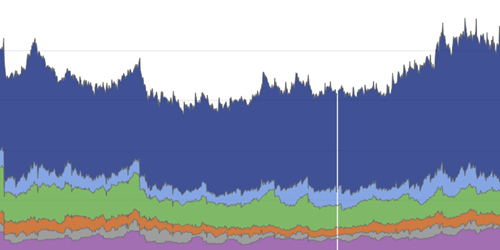Tri-Party Repo Transaction Volume By Tenor
Tenor
The tenor of a financial contract refers to the amount of time before that contract expires. Tenor aggregates can be used to examine the provision of funding over different time horizons. These charts present insights into the tenor of financing across various short-term funding markets.
Tri-party repo transaction volume by tenor
Transaction volume in tri-party repo market broken out by tenor
Skip the ChartIn tri-party repurchase (repo) transactions, participants know their counterparty, but transact against classes of collateral, rather than specific securities. As a result, tri-party repo is used only for financing, and not for obtaining specific securities. A custodian, usually a bank, maintains post-trade processing activities such as collateral selection, payments and deliveries, custody of collateral securities, and collateral management. Borrowers in tri-party repo tend to be larger dealers to which cash lenders are willing to be directly exposed.
This chart shows a breakdown of tri-party transactions by the repo's tenor, which is the amount of time between the initial trade of cash for securities and the repurchase of those securities. Financing needs can vary by time horizon, leading to demand for loans of a different tenor. Shorter-tenor trades maximize lenders' liquidity, typically reducing rates borrowers have to pay. However, borrowers in shorter-tenor
trades carry the risk that financing rates increase or that financing becomes unavailable, which is referred to as rollover risk. Examining volume across tenors provides a window into the availability of and demand for financing across time horizons. In periods of high volatility, longer-tenor trades can provide more stability to borrowers, but during these times it may also be difficult for lenders to extend credit at longer horizons.
Series Used
This OFR monitor is presented solely for informative purposes and should not be relied upon for financial decisions; it is not intended to provide any investment or financial advice. If you have any specific questions about any financial or other matter please consult an appropriately qualified professional. The OFR makes no warranty, express or implied, nor assumes any legal liability or responsibility for the accuracy, completeness, reliability, and usefulness of any information that is available through this website, nor represents that its use would not infringe on any privately owned rights.
Disclaimer Regarding Non-OFR Data and InformationFor convenience and informational purposes only, the OFR may provide links and references to nongovernment sites. These sites may contain information that is copyrighted with restrictions on reuse. Permission to use copyrighted materials must be obtained from the original source and cannot be obtained from the OFR or from the U.S. Treasury Department. The OFR is not responsible for the content of external websites linked to or referenced from this site or from the OFR web server. The U.S. government, the U.S. Treasury Department, the Financial Stability Oversight Council, and the OFR neither endorse the data, information, content, materials, opinions, advice, statements, offers, products, services, presentation, or accuracy, nor make any warranty, express or implied, regarding these external websites. Please note that neither the U.S. Treasury Department nor the OFR controls, and cannot guarantee, the relevance, timeliness, or accuracy of third-party content or other materials. Users should be aware that when they select a link on this OFR website to an external website, they are leaving the OFR site.
Suggested CitationOffice of Financial Research, “OFR Short-term Funding Monitor,” refreshed daily, https://www.financialresearch.gov/short-term-funding-monitor/ (accessed ).




